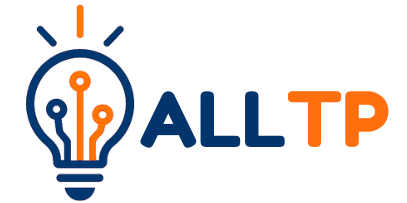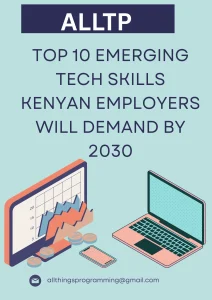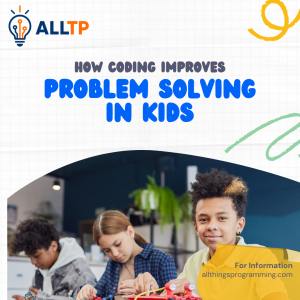Kenya has rapidly emerged as a leading tech hub in Africa, earning the nickname “Silicon Savannah” thanks to its vibrant ecosystem of startups, innovation hubs, and mobile-driven solutions. From mobile money platforms like M-Pesa to health-tech and agritech innovations, the country is shaping the continent’s digital future.
As technology continues to transform every sector, coding has become one of the most valuable skills in today’s job market. Whether it’s developing software, automating tasks, or building websites and apps, coding is at the core of digital innovation. Employers are increasingly seeking individuals who can solve problems using technology, making coding a high-demand skill across industries.
This demand has led to the rapid growth of coding schools and digital training centers across Kenya. These institutions are bridging the skills gap by offering practical, hands-on learning for both beginners and advanced learners, including children, youth, and adults.
Coding for kids is now more important than ever. It equips children with creativity, problem-solving abilities, and early exposure to future-ready skills. If you’re looking to get your child started, enroll them in All Things Programming, a child-first coding school in Nairobi offering engaging programs in Scratch, robotics, and game development.
The purpose of this article is to highlight some of the best coding schools in Kenya, tailored for different age groups and skill levels. Whether you’re a parent looking for a coding class for your child or a young adult ready to pursue a tech career, this guide will help you find the right place to start your journey.
Why Learn Coding in Kenya?
Kenya is fast becoming a digital powerhouse in Africa, with a surge in tech startups, innovation hubs, and digital solutions that address real-world problems. Cities like Nairobi, Mombasa, and Kisumu are home to numerous tech hubs such as iHub, Nailab, and SwahiliBox, where developers, entrepreneurs, and creatives collaborate to build the next big thing. This ecosystem provides fertile ground for anyone interested in technology and innovation.
At the same time, government and NGO initiatives are actively promoting digital literacy. Programs like Ajira Digital aim to equip youth with online work skills, while the Kenya Digital Economy Blueprint outlines a national strategy to integrate ICT into all areas of the economy. These efforts reflect a national commitment to preparing citizens for the digital age.
Coding is not just a local opportunity — it’s a global skill. With a laptop and internet connection, Kenyan coders can access international job markets, contribute to open-source projects, or land jobs with global tech companies. The rise of remote work and freelancing means that skilled developers can work with clients worldwide, earning competitive incomes without leaving their home country. According to a Harvard University report on digital skills in the global economy, coding and related competencies are among the most in-demand skills for global workforce participation.
Whether you’re looking to start a tech business, secure employment in Kenya’s digital economy, or work for companies abroad, learning to code opens doors to a world of possibilities.
What to Look for in a Coding School
With the rise of tech education in Kenya, there are now many coding schools to choose from — but not all offer the same quality or value. Whether you’re selecting a school for yourself or your child, here are key factors to consider:
1. Curriculum Quality and Relevance
A strong coding school should offer a well-structured, up-to-date curriculum that covers in-demand programming languages like Python, JavaScript, and frameworks such as React or Django. For more advanced learners, areas like data science, artificial intelligence (AI), and mobile app development are increasingly important. Make sure the program aligns with current tech industry trends and job market needs.
2. Age-Appropriate Programs
Not every course suits every learner. Look for schools that offer age-specific pathways, beginner-friendly tools like Scratch or Blockly for kids, structured lessons for teens, and career-focused tracks for adults. Age-appropriate content ensures that students stay engaged and build confidence at their own pace.
3. Certification and Internship Opportunities
A valuable coding school should provide certificates of completion and, where possible, help learners secure internships or industry attachments. These not only boost your resume but also give you real-world experience, which is crucial when seeking employment or freelance work.
4. Online vs. In-Person Learning
Depending on your location and schedule, you may prefer online classes, which offer flexibility and convenience, or in-person learning, which can provide more direct interaction and mentorship. Some schools offer hybrid models to combine the best of both.
5. Cost and Accessibility
Tech education should be affordable and inclusive. Look for schools that are transparent about their fees, offer payment plans, scholarships, or even free programs supported by NGOs or government initiatives. Also consider factors like internet access, class size, and learning materials when evaluating accessibility.
Top Coding Schools in Kenya (By Region or Niche)
Kenya is home to a growing number of coding schools that cater to different regions, age groups, and career goals. From physical campuses to fully online platforms, here are some of the top institutions leading the way in digital skills education:
1. All Things Programming
A standout choice for young learners, All Things Programming offers project-based coding classes for kids and teens. With a curriculum that includes Scratch, Python, web design, game development, and robotics, this Nairobi-based school focuses on hands-on learning and nurturing creativity from an early age. Its child-first approach, small group sessions, and personalized mentorship make it ideal for students between 6 and 16 years old looking to build a strong foundation in tech.
2. Moringa School
Known for its intensive bootcamps, Moringa School provides professional-level training in software engineering and data science. Their full-time programs are tailored for youth and young adults aiming to break into the tech industry. Moringa also partners with employers and offers job placement support, making it a great launchpad for tech careers.
3. Power Learn Project
This pan-African initiative offers free tech training to youth, with a mission to equip one million learners across Africa. In Kenya, they provide beginner-to-intermediate courses in software development, with a focus on empowering young people from underserved communities.
4. Ubunifu College
Ubunifu College specializes in mobile and web development, UI/UX design, and digital marketing. With a practical approach to learning and a strong emphasis on portfolio building, it appeals to students who want to become job-ready quickly.
5. SwahiliBox
Located in the heart of Mombasa’s Old Town, SwahiliBox is a community tech hub offering coding classes, mentorship, and innovation programs. It serves as a bridge between education and entrepreneurship, especially for youth in the coastal region.
6. LakeHub
Based in Kisumu, LakeHub provides tech training, startup incubation, and mentorship to youth in western Kenya. It offers beginner-friendly coding classes, digital literacy programs, and community-based support for aspiring innovators.
7. TechBridge Invest
This organization supports early-stage entrepreneurs and coders in Western Kenya through structured training programs in coding, design thinking, and business development. Their goal is to foster self-reliance and tech-driven solutions within local communities.
8. Zindua School
Zindua School offers affordable online training in software engineering and data science. Their part-time programs are designed for working professionals or students who prefer learning at their own pace. The school also provides mentorship and career support to help learners transition into tech roles.
9. Africa Code Week Kenya Initiatives
Africa Code Week offers free beginner coding workshops for children across Kenya and Africa. The program uses tools like Scratch to teach foundational skills and is supported by partners like UNESCO and SAP.
Coding for Kids and Teens
Introducing children to coding at an early age offers more than just tech skills; it builds problem-solving, creativity, logical thinking, and resilience. In today’s digital world, early exposure to programming can spark a lifelong interest in innovation and set the stage for future careers in technology.
Benefits of Early Coding Education
Children who learn to code develop strong cognitive and analytical abilities. They gain confidence as creators, not just consumers, of technology. Coding also improves attention to detail, teamwork, and perseverance as kids learn to build, test, and debug their own games or apps. These skills are transferable to many other academic and real-world scenarios.
Fun and Engaging Tools: Scratch, Robotics, and Games
Coding for kids often begins with visual programming languages like Scratch, which allow young learners to build stories, animations, and games using drag-and-drop blocks. As they grow older, many transition into Python, HTML/CSS, and JavaScript. Robotics kits and game development platforms like Tynker or Minecraft Education Edition are also widely used to make learning fun and practical.
Child-Friendly Coding Schools in Kenya
Some schools in Kenya are dedicated to nurturing young talent in a safe and engaging environment:
- AllThings Programming (Online): Offers age-specific courses in Scratch, robotics, Python, and game development. Kids learn through hands-on projects, small class sizes, and friendly mentorship.
- KidsComp Camp (Nationwide & Mobile): A mobile tech lab that brings coding, electronics, and digital literacy classes to rural and urban children across Kenya.
These programs focus on interactive learning that encourages experimentation, creativity, and teamwork.
What Parents and Students Are Saying
“My daughter now creates her own games in Scratch and wants to become a software engineer all thanks to AllThings Programming!” – Parent, Nairobi
“I thought coding was only for adults, but now I’ve built my first website in HTML!” – 12-year-old student, Nakuru
Scholarships and Free Opportunities
Learning to code doesn’t have to be expensive. Across Kenya, there are several government-backed programs, corporate initiatives, and NGO partnerships offering free or subsidized training in digital skills, making coding more accessible to youth from all backgrounds.
Ajira Digital Program
The Ajira Digital Program, an initiative by the Government of Kenya in partnership with the private sector, aims to equip young people with digital work skills. It provides free training in basic coding, digital marketing, freelancing, and data entry, with physical training centers and online content. The program helps youth earn income online and transition into the digital economy.
Google Africa Developer Scholarship (GADS)
In partnership with Pluralsight and Andela, Google offers the Africa Developer Scholarship, a free online training program for aspiring developers across Africa. Kenyan participants can access high-quality courses in Android development, web development, and cloud computing, along with mentorship and community support. Successful learners may also receive professional certification vouchers.
These opportunities are helping democratize tech education, ensuring that talented learners, regardless of income level, can unlock their potential in the digital world.
Success Stories and Testimonials
The true impact of coding education in Kenya can be seen in the real-life stories of learners who have transformed their futures through digital skills. From landing tech jobs to launching startups, these success stories show what’s possible when opportunity meets dedication.
From Learner to Developer: Job Placements
Many graduates of programs like Moringa School, Zindua, and Ajira Digital have gone on to secure roles at top local and international tech companies.
“I started with no tech background, but after graduating from Moringa School, I landed a junior developer job at a fintech company in Nairobi. Coding changed my life.”
– Joseph, Software Engineer
Teen Coders Building the Future
At All Things Programming, children as young as 10 are already building websites, mobile apps, and simple games.
“My son used to spend all his time playing games. Now, he’s building them! He’s more confident, focused, and talks about becoming a robotics engineer one day.”
Parent of a 12-year-old student
Empowering Women in Tech
Programs like AkiraChix and Power Learn Project are helping close the gender gap in STEM by empowering women to pursue coding careers.
“Coming from a low-income background, I never thought tech was for me. But after joining AkiraChix, I built my first web app and I’m now mentoring other young girls in my community.”
Mary, Junior Web Developer and AkiraChix alumna
Entrepreneurship Through Coding
In Kisumu, a graduate of LakeHub turned her coding skills into a small business offering website design and digital marketing services to local businesses.
“I didn’t just learn how to code I learned how to turn my skills into income. LakeHub gave me the tools to support myself and my family.”
– Achieng, Freelance Developer & Entrepreneur
These stories reflect the transformative power of digital skills training. With the right support, learners from every corner of Kenya are proving that tech isn’t just for the privileged it’s for anyone with curiosity, access, and the will to learn.
Challenges Facing Coding Education in Kenya
While Kenya’s coding education landscape is growing rapidly, several challenges continue to limit access and impact, especially for marginalized groups and rural communities. Recognizing these challenges is key to developing sustainable, inclusive solutions.
1. Limited Access in Rural Areas
Most well-equipped coding schools and innovation hubs are concentrated in major cities like Nairobi, Mombasa, and Kisumu. This leaves many students in rural and remote areas without access to quality tech education or mentorship. The digital divide continues to widen the gap between urban and rural learners.
2. High Cost of Devices and Internet
For many families, the cost of purchasing a computer or smartphone coupled with expensive and unreliable internet access makes learning to code unaffordable. This financial barrier discourages students from low-income backgrounds from pursuing digital skills.
3. Gender Disparities in Enrollment
Despite efforts to promote inclusion, girls and young women remain underrepresented in coding programs. Cultural stereotypes, lack of encouragement, and limited access to female role models in tech all contribute to this gap.
4. Suggested Solutions
To address these challenges, several practical solutions are already being implemented:
- Mobile tech labs: Programs like KidsComp Camp bring coding equipment and trainers directly to rural schools and communities.
- School partnerships: NGOs and ed-tech startups are collaborating with public schools to integrate coding into the curriculum and train teachers.
- Subsidized data & devices: Government and private sector players can help lower the cost of access by offering affordable internet bundles and donated devices.
- Girls-only initiatives: Organizations like AkiraChix and She Codes for Change are creating safe, empowering spaces for girls to learn and thrive in tech.
Addressing these barriers will ensure that every child and young adult in Kenya regardless of location or background, has the opportunity to learn, create, and succeed in the digital economy.
The Future of Coding in Kenya
Kenya’s digital transformation journey is just beginning, and the future of coding education looks both exciting and full of potential. As new technologies emerge and demand for tech talent grows, the country is poised to become a major contributor to Africa’s digital economy if the right foundations are laid today.
1. Emerging Tech Trends: AI, Data Science & Blockchain
While basic coding skills remain essential, the future lies in emerging fields like artificial intelligence (AI), data science, machine learning, cloud computing, and blockchain technology. Already, local developers and startups are building solutions in fintech, agritech, healthtech, and civic tech, and these industries require a deeper, more advanced skill set.
To stay competitive, Kenyan coding schools must begin integrating these technologies into their curricula, preparing learners not just for today’s jobs but for the jobs of the future.
2. Government’s Role: Scaling ICT in Education
The Kenyan government has signaled its commitment to digital literacy through initiatives like the Digital Literacy Programme, Ajira Digital, and the Kenya Digital Economy Blueprint. There are also plans to integrate ICT into the Competency-Based Curriculum (CBC) to ensure students start learning tech skills early.
Scaling such efforts across the country, especially in underserved areas will be critical in bridging the digital divide and preparing a tech-savvy generation.
3. The Call for Inclusive and Localized Curriculum
There’s a growing need for coding curriculums that are not only globally relevant but also locally meaningful. Schools and platforms must create learning paths that reflect the realities, languages, and needs of Kenyan learners, including modules in Kiswahili, African case studies, and projects that solve community problems.
Curriculums should also accommodate different learning styles, age groups, and educational backgrounds, ensuring that coding is not perceived as exclusive or elite.
4. The Shared Role of Parents, Educators, and the Private Sector
The future of coding in Kenya depends on collaborative efforts:
- Parents need to support their children’s interest in tech from an early age.
- Educators must be trained and equipped to teach coding confidently.
- Private sector players, including tech companies, telcos, and startups, should invest in training, mentorship, and infrastructure development.
By working together, these stakeholders can ensure coding education is equitable, accessible, and future-ready.
Kenya’s coding education landscape is evolving fast, powered by a vibrant tech scene, government support, and passionate educators. From young children building games with Scratch to teens exploring robotics and adults diving into web development and AI, coding is becoming an essential skill for the future.
While challenges like access, affordability, and gender disparities remain, inspiring progress is being made through mobile labs, free training programs, and inclusive initiatives. With continued investment from parents, schools, NGOs, and the private sector, coding can become a tool of empowerment for every Kenyan learner, regardless of background.
Whether you’re a parent seeking the best coding school for kids or a young adult ready to launch your tech career, Kenya offers a wide range of opportunities to begin your journey. The next generation of African tech leaders is already learning, building, and creating, and with the right support, you or your child could be one of them.




